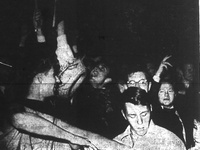With the arrival of the police, Meo, who describes himself as “perhaps more excitable than others,” led a charge over the fence to Pusey’s residence, where he was cornered after throwing bread at responding officers.
“In those days things were handled much less bureaucratically,” Meo says. “So I wasn’t officially arrested but you can imagine what my parents thought when they opened the Boston Globe a few weeks before my graduation and saw their son being led away by the cops.”
RESIGNED TO ENGLISH
In spite of the run-in with the police, Meo was still allowed to graduate without severe punishment. However, the bottom of Meo’s transcript now has a small caveat: it states that he was officially admonished by the University for behavioral misconduct.
“Luckily it was so small that no one really noticed it,” Meo says.
Multimedia
After the raucous weekend it became clear to students that the diplomas they were to receive would remain in English. Their displeasure had been noted and there was nothing left for them but to move forward and collect their “less than handsome” certificates, as Ravenel calls them.
“We raised a bit of hell,” Meo says. “But compared to what happened [later] in the ’60s this was a very mild protest indeed.”
Although the graduates were later offered an updated version of the diploma—still in English, but more like the former Latin version in appearance—many graduates chose to keep the diplomas they had received at Commencement.
“It was sort of a trophy in its sense of uniqueness,” Abbell says.
“I’m tempted to buy an old diploma off of eBay and change the name and date,” Ravenel says. “Just redo the damn thing.”
—Staff writer Erika P. Pierson can be reached at epierson@fas.harvard.edu.









